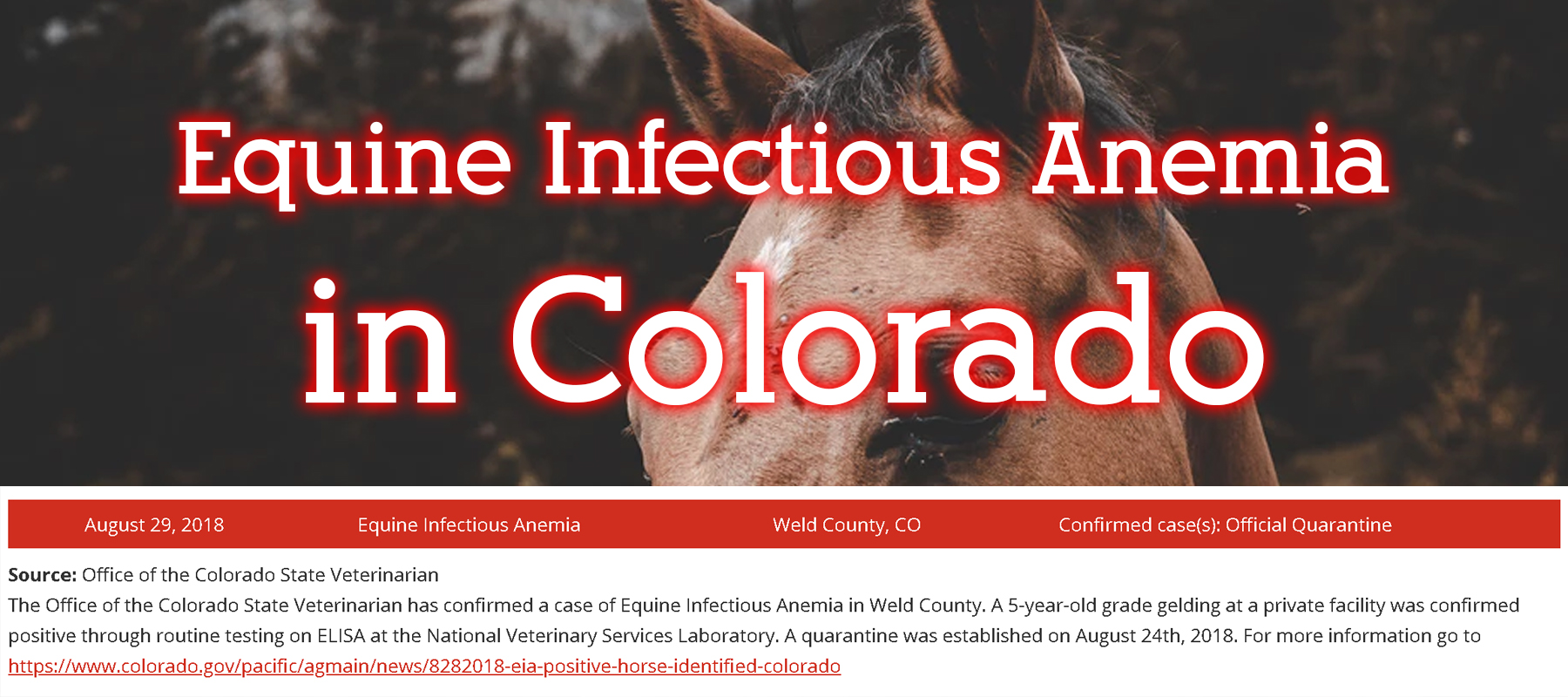FOR IMMEDIATE RELEASE
August 28, 2018
Contacts: Media:
Christi Lightcap, (303) 869-9005, Christi.Lightcap@state.co.us
Horse Owners & Veterinarians: State Veterinarian’s Office, (303) 869-9130, cda_co_animals@state.co.us
EIA-Positive Horse Identified In Colorado
BROOMFIELD, Colo. –The Colorado Department of Agriculture, State Veterinarian’s Office, was notified by the US Department of Agriculture’s National Veterinary Services Laboratory (NVSL) that a Weld County horse tested positive for Equine Infectious Anemia (EIA). The initial test result was received on August 24, 2018, with a re-test confirmation on August 28, 2018. The Weld County facility is currently under a quarantine order that restricts movement of horses until further testing is completed by the Colorado Department of Agriculture (CDA).
“The affected horse has been isolated from the remaining horses on the facility, which will be observed and retested in 60 days. We are actively tracing movements of the horse and others it came in contact with in Colorado and other states. The disease is most commonly spread by biting flies and we’re still in the midst of Colorado’s
FAQs about Equine Infectious Anemia
What is Equine Infectious Anemia?
Equine Infectious Anemia is a viral disease spread by bloodsucking insects, inappropriate use of needles, or other equipment used between susceptible equine animals such as horses, mules and donkeys. Horses may not appear to have any symptoms of the disease, although it also can cause high fever, weakness, weight loss, an enlarged spleen, anemia, weak pulse and even death.
How is it spread?
It is spread most commonly through blood by biting flies such as horse flies and deer flies.
What happens to an infected horse?
There is no cure for the disease, so infected animals have to be quarantined for life or euthanized.
Is there a danger to people?
No. The disease can only be spread to horses, mules and donkeys.
Is the disease common?
No. There has only been a small number of cases in the United States, although the disease exists in other parts of the world. A map of cases from the year 2017 is available at https://www.aphis.usda.gov/aphis/ourfocus/animalhealth/animal-disease-information/horse-disease-information/equine-infectious-anemia/ct_eia_distribution_maps.
How is the disease controlled?
Equine Infectious Anemia is a disease for which horses must be tested annually before they can be transported across state lines. The test for EIA is commonly called a Coggins Test. If you think your horse has come into contact with the lot/facility this horse was located at, please get your horse tested. This is a VERY serious disease and we need to be sure we control it.
More facts on EIA: http://www.cfsph.iastate.edu/Factsheets/pdfs/equine_infectious_anemia.pdf
Information taken from the Colorado State Department of Agriculture Website: https://www.colorado.gov/pacific/agmain/news/8282018-eia-positive-horse-identified-colorado






Leave a Reply
You must be logged in to post a comment.